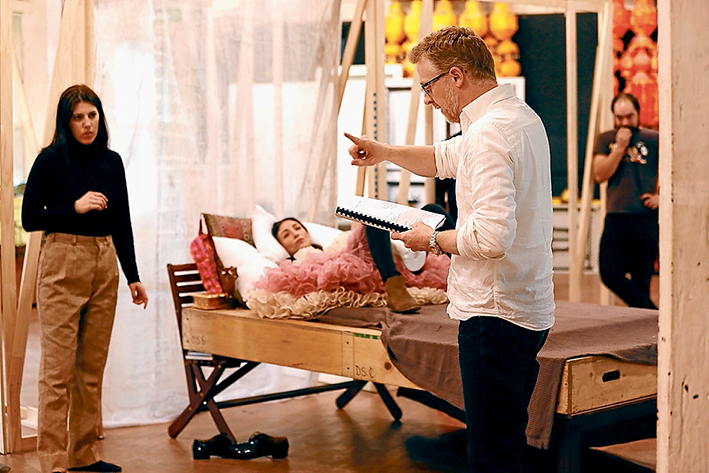By ANDREA LOUISE THOMAS

Little in life is more inspiring than a person who has great passion. Sydneysider Damien Ryan, who directs Hamlet for Bell Shakespeare this season, is enthralled with the poetry and dramatic possibilities of Shakespeare’s works. A scholar and teacher of the Bard, his interpretations and innovation are remarkable. Last year his direction of Bell Shakespeare’s Henry V swept the Sydney theatre awards winning critical acclaim for its inventiveness and clarity. I spoke with Ryan before Hamlet arrives at Frankston Arts Centre.
MINT: Where and when did your passion for Shakespeare begin?
RYAN: It began very young. My mum was a wonderful teacher and scholar of Shakespeare. She used to tell me the story of Twelfth Night as a bedtime story. I love Shakespeare from the perspective of a writer. I trained at university to be a journalist and it was the focus of my life. I fell into acting accidentally. I bought the complete works of Shakespeare and just devoured it. I learned 200 speeches – before I knew it I was acting and I’ve never stopped. I’ve read Shakespeare several hours a day for 20 years. I just can’t seem to extinguish my thirst for it.
MINT: How did to come to work with Bell Shakespeare Company?
RYAN: When I was about 26, I auditioned for John (Bell). He was my absolute hero. It was extremely exciting, but I was absolutely appalling, I was so rattled with nerves. John was incredibly patient pushing me and asking me to simplify, be truer and not to overdo it. It was remarkable generosity. I’ve never forgotten it. It’s influenced the way I audition people. John was a great mentor and he’s given me some of my very earliest opportunities to direct.
MINT: How do you take such complex text and make it so accessible?
RYAN: I often say to people all I am really is the first audience member. I want to sit back and ask, do I understand every word that’s being said, do I understand the relationships – are they clear and convincing and do I understand the world in which this script exists? I don’t come from a theatrical family. My dad was an engineer and my mum was a teacher. I often think, ‘Will my dad follow this bit?’ It’s a humble and unpretentious approach to telling stories.
MINT: What are the three most important aspects of good directing?
RYAN: One is to care very deeply for the audience’s experience of a play. Next is to insure that the director is bringing out the best in the actors – to help them enlarge their imagination and capacity to believe. The third would be clarity – to tell story as clearly as possible.
MINT: How do you see Hamlet relating to today’s global political climate?
RYAN: It’s a real political thriller. In Australian terms, it’s a play in which the government is coming closer and closer to having a complete surveillance of its citizenry in a global world where we feel our borders are under threat. Under Elizabeth I, it was an absolute police state in terms of controlling its citizenry and the suppression of freedom of thought and freedom of speech. These arguments are still fundamental. Right back to the Greeks and Romans, tragedies have always tried to teach us that human beings worry about external threats when in fact we are the biggest problem in our own lives. We create most of the regrets in our lives. This play teaches us that the enemy is within. It’s a warning to us about truth, about knowing who you are – ‘to thine own self be true.’ Revenge is another reason why this play is still relevant. We think of revenge tragedy as an old form, but if you look at what is going on in today’s world – we are still addicted to the cycle of revenge. I find it resonant on so many levels and those are just a few.
MINT: What lessons can today’s audience take from Hamlet?
RYAN: Fundamentally for me it’s that thing about telling the truth. If you cannot be true to yourself, you cannot be true to anyone. And the second one is balance. The play is trying to teach us, as the Ancient Greeks were, that a good life needs to be lived in proportion and not in excess. This play is about excessive feeling and it’s very powerful for that.
MINT: Does stage have the power to change social consciousness? Do you think that’s what Shakespeare intended?
RYAN: When I examine the work I think there is no way he was not seeking to change the whole epoch in which he lived and to bring greater enlightenment to the human soul. Surely the aim as a theatre maker should be holding up a mirror so that people walk out of the theatre feeling changed.
For a transformational theatre experience exploring life’s big questions that also examines the nature of our current world, see Bell Shakespeare’s Hamlet at Frankston Arts Centre on Tuesday 6 October at 8pm.
Bookings: the fac.com.au or 9784 1060.


